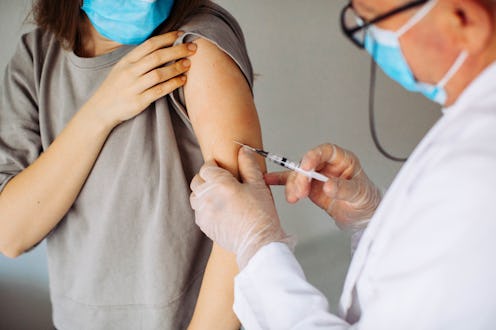Health
Can You Get The COVID Vaccine If You're Sick?
Don’t risk infecting someone else.

With the COVID vaccine becoming available to certain essential workers and older members of the general population, many people are feeling more hopeful and optimistic than they have since last March. But there's a lot of logistical hurdles to jump through before the vaccine can get into your arm. And once it's your turn, experts say you'll want to minimize anything that could complicate or delay you getting your shot — like being sick on the day of your vaccine appointment.
Can You Get The COVID-19 Vaccine If You're Sick?
“As per the CDC, there is no good evidence that acute illness makes a vaccine less effective or increases adverse effects,” says Dr. Robert Cole, MD, an intensive care medicine specialist in Camden, New Jersey, and author of How to Build a Smile. “However, as a precaution, the current recommendation is to delay vaccination if someone has any acute moderate or severe illness. In other words, if you have a mild cough, runny nose, or diarrhea, but are COVID negative, you can get the vaccine. Additionally, if you are taking antibiotics, you can also still get vaccinated safely.”
However, if you can wait to get vaccinated, you might want to do so. “If you are sick, it would be best to wait to get the COVID vaccine until you are fully recuperated,” Dr. Soma Mandal, MD, a board-certified internist at Summit Medical Group in Berkeley Heights, New Jersey, tells Bustle. “This is because the COVID-19 vaccine can potentially cause body aches, fever, fatigue, headache, joint and muscle pain, which can make the symptoms of an existing upper respiratory infection worse.” Why pile on more feeling sick if you can avoid it?
Here's When You Should Not Get The COVID Vaccine
If there's a chance you have COVID, however, then it's a different story. If you are having upper respiratory symptoms, the first thing you should do is get tested for COVID-19, Dr. Mandal says. For one thing, if you do have COVID or are awaiting test results, you should immediately self-isolate, and definitely shouldn't expose the person giving you the shot. For another, Dr. Anthony Fauci, director of the National Institute of Allergy and Infectious Diseases, said in a Jan. 6 C-span interview that you should wait three months to get the COVID vaccine if you have already had the virus. The theory is that waiting would prevent interference between naturally occurring antibodies and the ones the vaccine triggers.
“If you currently have the virus, then getting vaccinated will not be immediately helpful as the body takes time to mount an immune response,” says Dr. Eudene Harry, MD, a board-certified emergency medicine physician in Orlando, Florida. “If you have recently received flu or any other vaccinations, then it is recommended by the CDC that you wait to receive COVID vaccine at least 14 days.” In any case, if you have had COVID-19, it is still recommended that you eventually receive the vaccine, as it is still unclear how long immunity from infection lasts, Dr. Harry says.
If you're sick on the day of your appointment, and there's any chance you could have COVID, stay home and reschedule your appointment. You can do so by calling the public health authority where you made your appointment in the first place. Above all, it’s best to talk to your doctor about any concerns you have about the vaccine to ensure you receive it at the most appropriate time for your individual situation.
Experts:
Dr. Robert Cole, MD
Dr. Soma Mandal, MD
Dr. Eudene Harry, MD